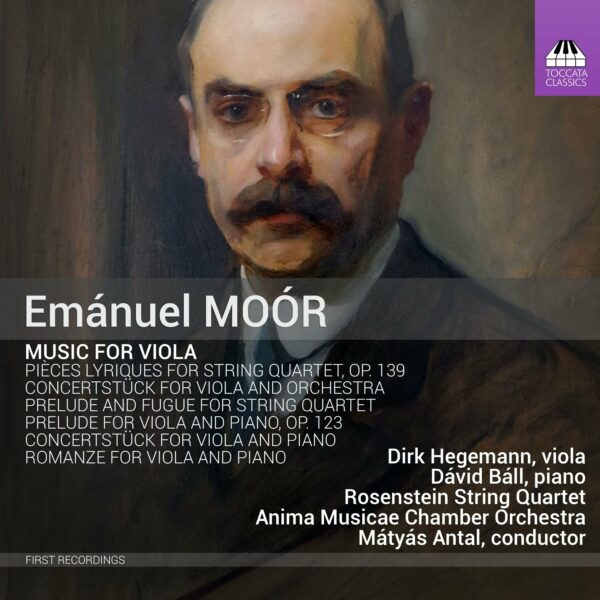Emánuel Moór: Music for Viola
The works of Emánuel Moór (1863–1931) ought to be celebrated as among the major achievements of Romantic music, but because of Moór’s peripatetic life – he was born in Hungary, studied in Vienna (with Bruckner), performed in the US and across Europe, became a UK citizen and settled and died in Switzerland – no country has claimed and promoted him to the degree he deserves. Moór’s musical language offers a deeply satisfying blend of contrapuntal mastery and ardent lyricism, as the works on this album – written for or involving the viola – demonstrate. In time he will be recognised as one of the masters of his age.
Dirk Hegemann, viola
Dávid Báll, piano (Tracks 3, 8, 9)
Rosenstein String Quartet (Tracks 1–2, 4–7):
Michael Hsu and SooEun Lee, violins
Dirk Hegemann, viola
Markus Tillier, cello
Anima Musicae Chamber Orchestra (Track 10)
Mátyás Antal, conductor (Track 10)
Listen To This Recording:
- I Prelude
- II Fugue
- Prelude in E major for viola and piano, Op. 123
- I Andante con moto
- II Tempo di valse
- III Andante sostenuto
- IV Allegro moderato
- Romanze for Viola with Piano Accompaniment, P202 (1895)
- Concertstück in C sharp minor for viola and piano, P166
- Concertstück in C sharp minor for viola and orchestra, P167 (orch. Beraldo, 2020)
Prelude and Fugue for string quartet, P182 (1917)
Prelude in E major for viola and piano, Op. 123 (1910–12; arr. Hegemann, 2021)
Pièces lyriques for string quartet, Op. 139
FIRST RECORDINGS

MusicWeb International :
‘The performances and recordings (firsts for all these works) are warm and the players’ essential advocacy for such unfamiliar music is never in doubt.’
—Rob Barnett, MusicWeb International
MusicWeb International :
‘Hegemann is the disc’s leading light, but Dávid Báll proves a worthy accompanist, the Rosenstein String Quartet plays with tonal richness and, in the final work, the Anima Musicae Chamber Orchestra is finely directed by Mátyás Antal. As always from this source, the booklet notes are a source of nutritious biographical and musicological information; they deserve a thorough read.’
—Jonathan Woolf, MusicWeb International